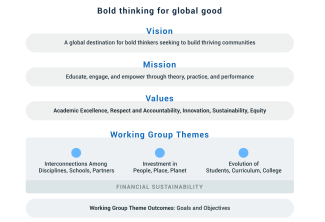All of these values are interrelated and equally critical to accomplishing Ithaca College’s vision and mission.
Academic excellence. Ithaca College views academic excellence as the integration of theory, practice, and performance. The College’s unique fusion of the liberal arts and professional programs assumes that knowledge needs to inform and be informed by hands-on experience, real-life application, and concrete action. Curricular and co-curricular activities should provide all community members with opportunities to develop, debate, and critically evaluate strategies to address complex problems.
Respect and accountability. Mutual care, respect, and accountability are expected in all facets of institutional life. Ithaca College values every community member’s dignity and seeks to create a social environment where everyone can flourish and be their authentic self. As members of a thriving community, we demonstrate practices that foster a sense of belonging, shared responsibility, collaboration, innovation, and achievement. Accountability to Ithaca College’s values and policies gives us the opportunity to consider the consequences of our actions, to self-examine, and to find ways to restore trust and forgiveness when harm is caused. A culture of care and love grows when we respectfully engage in learning opportunities that help us shift out of our presumed paradigms.
Innovation. A culture of innovation enables us to remain forward thinking, nimble, and adaptable to social and technological change. When people from diverse backgrounds and experiences are empowered to exchange ideas and collaboratively problem-solve, innovation grows, creativity sparks, and institutional and personal goals are achieved. Collaboration between the professional and liberal arts traditions cultivates academic excellence in the spirit of theory, practice, and performance.
Sustainability. Adopting institutional strategies that offer ecological and resource-based sustenance to the people and places of Ithaca College ensure its futurity. Sustainability means increasing our usage of renewable energy sources and reducing our carbon footprint because we understand the impact of our decisions on the community and the planet. It means practicing good stewardship of financial resources. It means fostering connections among students, faculty, staff, alumni, and administrators to serve the public good. We activate critical thinking, scholarly inquiry, professional skills, and performance in order to positively impact, sustain, and advance our local and global communities.
Equity. We adopt an equity framework that proactively seeks to make Ithaca College accessible, affordable, and inclusive for all people, especially those impacted by systemic disadvantage, marginalization, and exclusion. This endeavor requires resource allocation as well as organizational structures that facilitate equity. It demands adopting strategies for increasing the representational diversity of students, faculty, and staff who are currently underrepresented in higher education. It also means implementing inclusive policies and practices proven to foster the retention, belonging, and advancement of people who face systemic disadvantages and discrimination based on race, gender, sexual orientation, religion, ability, and national origin. Finally, an equity framework assumes inclusive decision-making processes, transparency, and accountability as the primary ways of working together.


